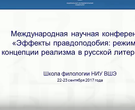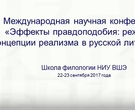- A
- A
- A
- АБB
- АБB
- АБB
- А
- А
- А
- А
- А
- Национальный исследовательский университет «Высшая школа экономики»
- Факультет гуманитарных наук
- Школа филологических наук
- Russian Prefixes as Verb Classifiers. Lecture of Laura Janda (University of Tromso)
-
Школа
- О школе
- Сотрудники
- Образовательная деятельность
- Научные семинары школы
- Аспирантская школа по филологическим наукам
- Майнор "Инструменты эффективной коммуникации"
-
Проекты школы
-
- Летопись жизни и творчества Б.Л. Пастернака
- Большой проект «Русская литература в социальном измерении: компьютерная платформа СОЦИОЛИТ»
- Всеволод Некрасов. Литературный архив
- Большой проект «Речевые практики»
- Трансформация коммуникативной модели в эго-текстах русского модернизма
- Сравнительное изучение метрического стихосложения на фоне языковой просодии: цифровая аналитическая платформа “Прозиметрон”
-
- Майнор "История литературы"
-
Подразделения
- Лаборатории
- Научно-учебные группы
- Мандельштамовский центр
Адрес: 105066, г. Москва,
Старая Басманная ул., д. 21/4
Т. 1: Разделы I–XI. М.: Русский фонд содействия образованию и науке (Университет Дмитрия Пожарского), 2025.
Новое литературное обозрение. 2025. № 4. С. 76-92.
В кн.: Индоевропейское языкознание и классическая филология - XXIX (1). СПб.: Институт лингвистических исследований РАН, 2025. С. 425-430.
Адрес: 105066, г. Москва,
Старая Басманная ул., д. 21/4
Russian Prefixes as Verb Classifiers. Lecture of Laura Janda (University of Tromso)
I hypothesize that the Russian “purely aspectual” prefixes are a verb classifier system. I present an extensive set of tests for this hypothesis. The tests include comparison of distributional data with definitions for classifier systems, plus five different statistical studies proving that the behavior of each prefix is unique and explainable by recourse to its meaning. All of the evidence confirms the hypothesis and at the same time supports the Vey and van Schooneveld proposal that the prefixes are never “empty” but instead overlap with the meanings of the verbs. My analysis goes beyond the Vey and van Schooneveld overlap proposal in that I establish a specific network of meanings for each prefix, rather than assigning an abstract invariant meaning. Recognizing Russian as a verb classifier language brings numerous advantages, facilitating cross-linguistic comparisons and improving both description and pedagogy
- ВКонтакте
- Telegram
- О ВЫШКЕ
- Цифры и факты
- Руководство и структура
- Устойчивое развитие в НИУ ВШЭ
- Преподаватели и сотрудники
- Корпуса и общежития
- Закупки
- Обращения граждан в НИУ ВШЭ
- Фонд целевого капитала
- Противодействие коррупции
- Сведения о доходах, расходах, об имуществе и обязательствах имущественного характера
- Сведения об образовательной организации
- Людям с ограниченными возможностями здоровья
- Единая платежная страница
- Работа в Вышке
- ОБРАЗОВАНИЕ
- Лицей
- Довузовская подготовка
- Олимпиады
- Прием в бакалавриат
- Вышка+
- Прием в магистратуру
- Аспирантура
- Дополнительное образование
- Центр развития карьеры
- Бизнес-инкубатор ВШЭ
- Образовательные партнерства
- Обратная связь и взаимодействие с получателями услуг
-
http://www.minobrnauki.gov.ru/
Министерство науки и высшего образования РФ
-
https://edu.gov.ru/
Министерство просвещения РФ
-
http://www.edu.ru
Федеральный портал «Российское образование»
-
https://elearning.hse.ru/mooc
Массовые открытые онлайн-курсы
- © НИУ ВШЭ 1993–2025 Адреса и контакты Условия использования материалов Политика конфиденциальности Карта сайта
- Редактору





